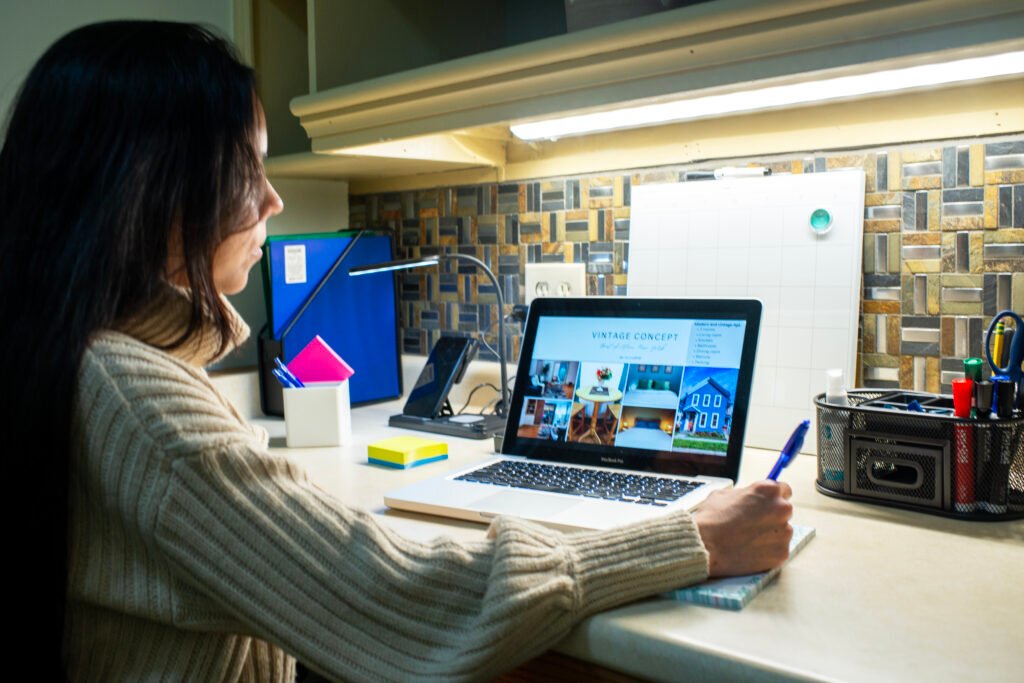Did you know that the global vacation rental market is projected to reach a staggering $112.5 billion by 2027, growing at a remarkable CAGR of 7.1%? This explosive growth in the short-term rental industry presents a lucrative opportunity for aspiring entrepreneurs and property investors alike. Whether you’re looking to leverage your existing real estate assets or start a new venture, this comprehensive guide will equip you with the knowledge and strategies to build a thriving short-term rental business.
From understanding the market trends and target demographics to navigating the legal landscape, selecting the perfect property, and crafting an irresistible guest experience, this article covers the essential elements of launching and scaling a successful short-term rental enterprise. Dive in as we explore the world of Airbnb hosting, vacation rental management, and cutting-edge property investment strategies that can help you capitalize on the booming short-term rental market.
Key Takeaways
- The global vacation rental market is projected to reach $112.5 billion by 2027, offering a lucrative opportunity for aspiring entrepreneurs and property investors.
- This comprehensive guide covers all the essential elements of starting and managing a successful short-term rental business, from market understanding to property selection, legal considerations, and business growth strategies.
- The article explores the latest trends, target demographics, and seasonal demand fluctuations in the short-term rental industry, equipping readers with valuable insights.
- Key topics include legal requirements, property selection, setting up the rental, pricing strategies, marketing, guest relations, and leveraging technology to optimize business operations.
- The guide provides practical advice and best practices to help readers navigate the short-term rental landscape and build a thriving vacation rental enterprise.
Understanding the Short-Term Rental Market
As hospitality entrepreneurship continues to evolve, the vacation rental management industry has emerged as a thriving and dynamic sector. To navigate this landscape successfully, it’s crucial to understand the key trends, target demographics, and seasonal demand patterns that shape the short-term rental market.
Trends Influencing the Market
The short-term rental industry has witnessed a surge in popularity in recent years, driven by factors such as the rise of platform-based booking platforms, increased consumer preference for authentic, local experiences, and the growing demand for flexible, cost-effective travel options. Entrepreneurs in the hospitality industry must stay attuned to these market trends to capitalize on emerging opportunities.
Target Demographics
- Millennials and Gen Z travelers: These younger generations seek unique, experiential accommodations that offer a sense of local immersion.
- Families and groups: Short-term rentals provide spacious, amenity-rich options that cater to the needs of families and larger traveling parties.
- Business travelers: The flexibility and cost-effectiveness of short-term rentals make them an attractive option for business professionals seeking alternatives to traditional hotels.
Seasonal Demand Fluctuations
The short-term rental market is often subject to seasonal fluctuations, with peak demand periods corresponding to popular vacation seasons, holidays, and events. Savvy vacation rental management professionals closely monitor these seasonal trends to optimize pricing, inventory, and marketing strategies, ensuring they can capitalize on high-demand periods while mitigating the impact of low-demand seasons.
“The short-term rental industry has become a game-changing opportunity for hospitality entrepreneurs who can navigate its unique dynamics and deliver exceptional guest experiences.”
Legal Considerations for Short-Term Rentals
As an Airbnb host or a property investor exploring the world of Airbnb hosting, it’s crucial to navigate the legal landscape of short-term rentals. From licensing requirements to zoning regulations and insurance needs, understanding the legal aspects of your business is essential for ensuring compliance and protecting your investment.
License and Permit Requirements
Depending on your location, operating a short-term rental may require obtaining specific licenses and permits. This can include business licenses, vacation rental permits, or even special zoning approvals. Be sure to research the local regulations in your area and comply with all necessary requirements to avoid fines or legal complications.
Zoning Laws and Regulations
Short-term rentals are often subject to zoning laws and regulations that vary by municipality. Some areas may have restrictions on the number of rental days, the type of properties allowed, or even specific neighborhoods where short-term rentals are prohibited. Familiarize yourself with the zoning laws in your market to ensure your property investment strategies align with the local regulations.
Insurance Needs
Protecting your investment and your guests is essential when operating a short-term rental. Ensure that you have the appropriate insurance coverage, such as liability, property, and even short-term rental-specific policies. This will help safeguard your business against unexpected events, property damage, or guest-related incidents.
| Legal Consideration | Description | Key Takeaway |
|---|---|---|
| License and Permit Requirements | Obtaining necessary business licenses, vacation rental permits, and zoning approvals | Research local regulations to ensure compliance |
| Zoning Laws and Regulations | Restrictions on rental days, property types, and designated rental zones | Familiarize yourself with zoning laws in your area |
| Insurance Needs | Liability, property, and short-term rental-specific coverage | Secure appropriate insurance to protect your investment |

“Navigating the legal aspects of short-term rentals is crucial for Airbnb hosts and property investors. Compliance and protection should be top priorities.”
Choosing the Right Property
Selecting the ideal property is a crucial step in establishing a successful short-term rental business. From the types of properties suitable for vacation rentals to the location considerations and guest-attracting features, this section provides a comprehensive guide to help investors make strategic property decisions that can maximize their vacation rental management efforts and drive profitable property investment strategies.
Types of Properties Suitable for Short-Term Rentals
- Single-family homes
- Condominiums or apartments
- Townhouses or duplexes
- Vacation homes or cabins
- Unique properties like treehouses or tiny homes
Location Considerations
The location of the property is a crucial factor in the success of a short-term rental. Factors to consider include:
- Proximity to popular tourist destinations or landmarks
- Access to transportation hubs, such as airports or major highways
- Availability of nearby amenities, like restaurants, shopping, and entertainment
- Consideration of local zoning laws and regulations
Property Features that Attract Guests
To appeal to short-term rental guests, properties should offer a range of desirable features, such as:
| Feature | Benefit |
|---|---|
| Outdoor living spaces (e.g., balconies, patios, or yards) | Enhance the guest experience and provide additional living areas |
| Unique or luxury amenities (e.g., hot tubs, fireplaces, or gourmet kitchens) | Differentiate the property and attract guests seeking a premium experience |
| Smart home technology (e.g., keyless entry, automated lighting, or voice control) | Improve the convenience and efficiency of the guest experience |
By carefully considering these factors, investors can identify the most suitable properties for their short-term rental business and position their properties to attract a steady stream of guests, ultimately enhancing their vacation rental management efforts and property investment strategies.
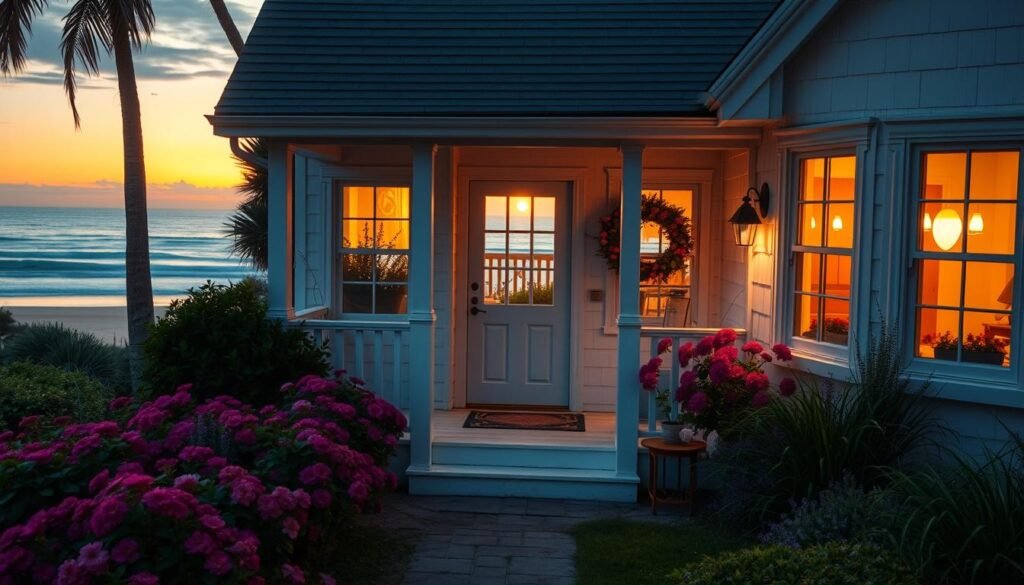
Setting Up Your Short-Term Rental
Preparing your property for Airbnb hosting requires careful attention to essential furnishings, creating a welcoming atmosphere, and leveraging smart home technology to enhance the guest experience. By optimizing your short-term rental, you can set the stage for memorable stays and establish a successful Airbnb hosting business.
Essential Furnishings and Amenities
Curating the right furnishings and amenities is crucial for making your guests feel at home. Start by ensuring your property has comfortable beds, quality linens, and ample storage space. Consider including essential kitchen appliances, cookware, and dining essentials to cater to guests who prefer to prepare their own meals. Providing high-speed internet, smart TVs, and charging stations will also enhance the overall experience.
Creating a Welcoming Atmosphere
Transform your short-term rental into an inviting oasis by focusing on thoughtful design details. Incorporate local artwork, cozy textiles, and strategic lighting to create a warm and visually appealing ambiance. Paying attention to cleanliness, organization, and thoughtful touches like fresh flowers or a welcome basket can go a long way in making your guests feel valued and appreciated.
Technology and Smart Home Options
Integrating smart home technology into your short-term rental can simplify management and provide a seamless experience for your guests. Consider installing smart locks, programmable thermostats, and voice-controlled assistants to streamline access, climate control, and communication. Investing in a reliable property management system can also automate tasks like booking, guest communication, and cleaning scheduling, allowing you to focus on hospitality entrepreneurship.
| Essential Furnishings | Welcoming Atmosphere | Smart Home Features |
|---|---|---|
|
|
|
By carefully curating your short-term rental with essential furnishings, a welcoming atmosphere, and smart home technology, you can create an exceptional guest experience that will set your Airbnb hosting business apart.

Pricing Your Short-Term Rental
Establishing the right pricing strategy is crucial for maximizing your vacation rental management and generating a steady passive income stream. To achieve this, you’ll need to delve into competitive analysis, dynamic pricing tactics, and thoughtful fee structures.
Competitive Analysis and Market Rates
Begin by researching the market rates for similar properties in your area. Analyze the pricing of your competitors and identify the factors that influence their rates, such as location, amenities, and seasonal demand. This will help you set your own pricing at a competitive level while ensuring you remain profitable.
Dynamic Pricing Strategies
Embrace the power of dynamic pricing to adjust your rates in response to market fluctuations. Utilize tools and software that monitor demand, occupancy rates, and external factors like events or holidays. By implementing dynamic pricing, you can maximize your revenue during peak periods and remain flexible during slower seasons.
Fees and Additional Charges
- Consider implementing a cleaning fee to cover the cost of post-stay cleaning and maintenance.
- Offer optional add-ons, such as early check-in or late check-out, for an additional fee.
- Clearly communicate all fees and charges upfront to ensure transparency and manage guest expectations.
By strategically pricing your short-term rental, you can strike the right balance between competitiveness and profitability, enabling you to thrive in the vacation rental management industry and build a sustainable passive income stream.
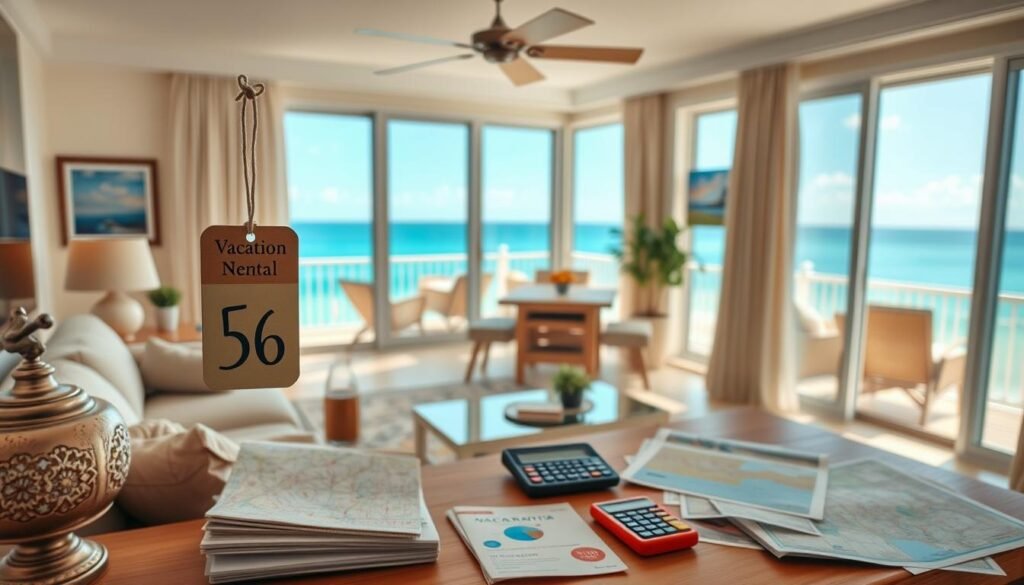
“Effective pricing is the key to unlocking the full potential of your vacation rental business.”
Marketing Your Short-Term Rental
As a hospitality entrepreneur navigating the world of Airbnb hosting, one of the most crucial aspects of your short-term rental business is effective marketing. Crafting an attractive listing, leveraging social media platforms, and building a strong brand identity can all play a vital role in attracting potential guests and maximizing occupancy rates.
Crafting an Attractive Listing
Your Airbnb listing is the first impression potential guests will have of your short-term rental. Ensure that it is visually appealing, with high-quality photographs that showcase the unique features and amenities of your property. Craft a compelling description that highlights the benefits and experiences your guests can expect, using keywords such as “Airbnb hosting” and “hospitality entrepreneurship” to optimize for search engines.
Utilizing Social Media and Online Platforms
- Establish a presence on popular social media platforms like Instagram, Facebook, and Twitter to connect with your target audience.
- Regularly post engaging content, such as photos of your rental, local area highlights, and guest testimonials, to build brand awareness and foster a loyal following.
- Leverage online vacation rental platforms like Airbnb, Vrbo, and Expedia to list your property and reach a wider audience.
Building a Brand Identity
Developing a cohesive brand identity can help your short-term rental stand out in a crowded market. Consider creating a unique logo, branding, and messaging that aligns with the aesthetic and experience you want to offer your guests. Consistency across your website, social media channels, and guest communications can strengthen your brand recognition and build trust with potential customers.
| Marketing Strategy | Key Objectives | Potential Benefits |
|---|---|---|
| Attractive Listing | Showcase property features, highlight unique experiences | Increased visibility, higher booking rates |
| Social Media and Online Platforms | Engage with target audience, build brand awareness | Expand reach, generate direct bookings |
| Brand Identity | Establish a consistent, memorable brand presence | Differentiate from competitors, build guest loyalty |
By implementing these marketing strategies, you can effectively promote your short-term rental and attract a steady stream of guests, ultimately driving the success of your Airbnb hosting and hospitality entrepreneurship ventures.

Managing Guest Relations
Effective vacation rental management requires mastering the art of guest relations. As a hospitality entrepreneur, your ability to communicate effectively, handle guest expectations, and resolve issues efficiently can make or break the success of your short-term rental business.
Effective Communication Strategies
Establishing clear and open communication with your guests is essential. Respond promptly to inquiries, provide detailed information about your rental property, and maintain a friendly and professional tone throughout your interactions. Leverage various channels, such as email, text messaging, and a dedicated guest communication platform, to ensure seamless communication.
Handling Guest Expectations
Set realistic expectations from the outset by accurately describing your vacation rental’s features, amenities, and policies. Provide detailed information about check-in and check-out procedures, house rules, and any additional fees or charges. Proactively address any potential concerns or questions to avoid misunderstandings and ensure a positive guest experience.
Resolving Issues and Complaints
Despite your best efforts, issues and complaints may arise during a guest’s stay. Develop a systematic approach to address these situations, focusing on empathy, problem-solving, and timely resolution. Actively listen to your guests, acknowledge their concerns, and work collaboratively to find a mutually acceptable solution. Maintain a positive and professional demeanor, as your handling of these situations can significantly impact your property’s reputation and future bookings.
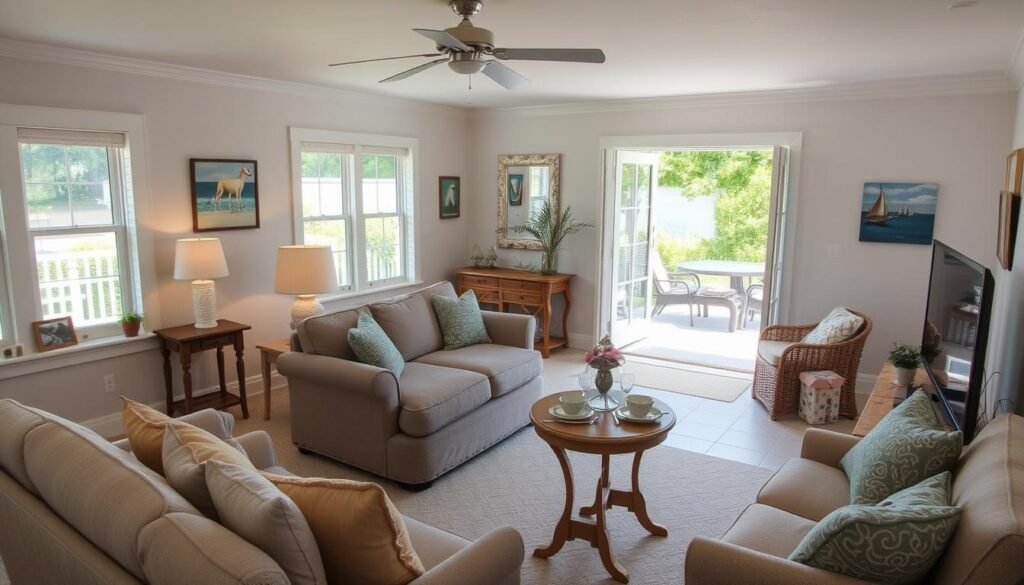
By mastering the art of guest relations, you’ll not only ensure exceptional experiences for your guests but also build a loyal customer base and maintain a strong reputation within the vacation rental industry. Investing in effective communication, expectation management, and conflict resolution strategies will pay dividends for your hospitality entrepreneurship endeavors.
Cleaning and Maintenance Practices
Maintaining a clean and well-cared-for property is essential for any successful Airbnb hosting or vacation rental management business. Establishing a thorough cleaning schedule, implementing comprehensive maintenance checklists, and deciding between professional cleaning services and a DIY approach are crucial steps to ensure your short-term rental property remains in top condition.
Establishing a Cleaning Schedule
Develop a consistent cleaning schedule that addresses the needs of your property and the expectations of your guests. Factors such as the size of the home, the number of guests, and the length of stays will all influence the frequency and depth of cleaning required. Ensure that all high-traffic areas, including bathrooms, kitchens, and common living spaces, are thoroughly cleaned between each guest’s stay.
Maintenance Checklists
- Create a detailed maintenance checklist to address routine tasks such as changing air filters, testing smoke detectors, and inspecting plumbing and electrical systems.
- Regularly review and update your maintenance checklist to address any issues that arise or changes in the property’s condition.
- Assign responsibilities for completing maintenance tasks to either yourself or a designated caretaker to ensure nothing falls through the cracks.
Professional Cleaning Services vs. DIY
Decide whether to outsource your cleaning and maintenance tasks to a professional service or handle them yourself. Professional cleaning services can provide a consistent, high-quality clean, but may come at a higher cost. Opting for a DIY approach can save money but requires a significant time investment and may not deliver the same level of attention to detail.

Ultimately, the decision between professional cleaning services and a DIY approach will depend on your budget, the size and complexity of your property, and your personal preference for hands-on management. Carefully weigh the pros and cons to determine the best cleaning and maintenance strategy for your Airbnb hosting or vacation rental management business.
Guest Experience Enhancements
In the world of hospitality entrepreneurship and vacation rental management, providing an exceptional guest experience is paramount. By going beyond the basics and offering unique experiences, short-term rental hosts can create lasting memories for their guests and foster a loyal following.
Creating Local Guides and Recommendations
One way to enhance the guest experience is by curating a comprehensive local guide filled with your personal recommendations. This can include the best restaurants, hidden gems, outdoor activities, and cultural attractions in the area. Not only does this demonstrate your knowledge of the local community, but it also helps guests make the most of their stay and feel like a local during their visit.
Offering Unique Experiences
Going the extra mile to offer unique experiences can set your short-term rental apart from the competition. This could involve arranging in-home cooking classes with a local chef, organizing a private wine tasting, or coordinating a guided tour of the neighborhood. By tailoring these experiences to your guests’ interests, you can create a memorable and personalized stay that keeps them coming back.
Gathering and Implementing Guest Feedback
Continuously seeking and acting upon guest feedback is essential for enhancing the overall experience. Encourage guests to share their thoughts and suggestions, whether through post-stay surveys, online reviews, or personal communication. Use this valuable insight to make improvements to your property, update your amenities, or adjust your guest services. By demonstrating a commitment to continuous improvement, you’ll build a reputation for exceptional hospitality and create loyal customers.

“The secret to a successful vacation rental management business is anticipating and exceeding your guests’ expectations at every turn.”
| Guest Experience Enhancement Strategies | Benefits |
|---|---|
| Creating Local Guides and Recommendations | Helps guests make the most of their stay and feel like a local |
| Offering Unique Experiences | Sets your short-term rental apart and creates lasting memories |
| Gathering and Implementing Guest Feedback | Demonstrates a commitment to continuous improvement and builds customer loyalty |
Leveraging Technology in Your Business
As an Airbnb host or a property investor interested in short-term rentals, embracing technological solutions can significantly streamline your business operations and enhance the overall guest experience. From booking management tools to smart home integration, the world of technology offers a wealth of opportunities to optimize your short-term rental strategies.
Booking Management Tools
Efficient booking management is the backbone of a successful short-term rental business. Platforms like Airbnb, VRBO, and HomeAway offer integrated booking systems, but you can also explore dedicated software solutions to centralize your reservations, synchronize availability, and manage pricing across multiple channels. These tools can automate tedious tasks, reduce the risk of double-bookings, and provide valuable insights into your occupancy rates and revenue trends.
Channel Management Software
To reach a wider audience and maximize your property’s visibility, utilizing channel management software can be a game-changer. These tools allow you to list your short-term rental on various online platforms, from the major vacation rental sites to niche marketplaces, with a single point of control. By streamlining your listings and synchronizing availability, you can save time, ensure consistent pricing, and seamlessly manage your Airbnb hosting or property investment strategies across multiple channels.
Smart Home Integration
- Enhance the guest experience with smart home technologies, such as voice-activated assistants, programmable thermostats, and keyless entry systems.
- Automate tasks like lighting, temperature control, and security, providing your guests with a modern and convenient stay.
- Leverage data from smart home devices to optimize your property’s efficiency, track energy usage, and make informed decisions about upgrades and improvements.
By embracing the power of technology, you can streamline your short-term rental business, improve guest satisfaction, and unlock new opportunities for growth and profitability in your Airbnb hosting or property investment strategies.
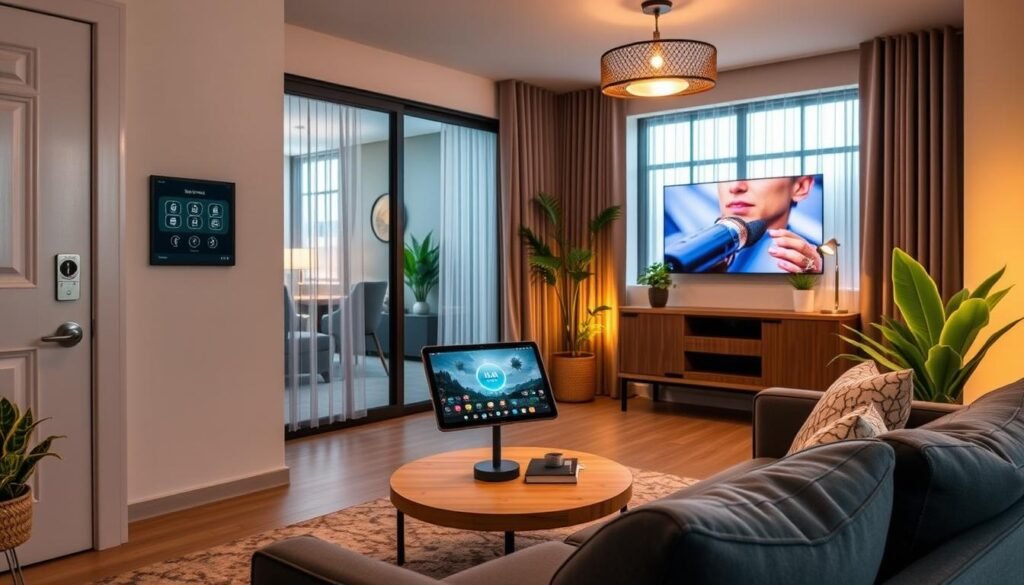
Understanding Revenue and Expenses
As you embark on your short-term rental journey, it’s crucial to have a firm grasp of the financial aspects of your business. This section will delve into the intricacies of revenue and expense management, empowering you to make informed decisions and maximize your passive income streams from property investment strategies.
Detailed Profit and Loss Analysis
Conducting a comprehensive profit and loss analysis is the foundation for understanding your short-term rental’s financial performance. This involves closely monitoring your revenue, including nightly rates, occupancy rates, and any additional fees, as well as diligently tracking your operating expenses, such as cleaning, maintenance, utilities, and insurance. By closely examining these metrics, you can identify areas for improvement and make strategic adjustments to optimize your profitability.
Budgeting for Operating Costs
Effective budgeting is key to maintaining a healthy cash flow and ensuring the long-term sustainability of your short-term rental business. Carefully analyze your historical data to anticipate and plan for recurring expenses, such as property taxes, licenses, and routine maintenance. Additionally, allocate funds for unexpected repairs or fluctuations in utility costs to ensure your business remains financially resilient.
Strategies for Maximizing Profit
- Implement dynamic pricing strategies to capture peak demand and adjust rates accordingly.
- Explore opportunities to upsell additional services or amenities to your guests.
- Streamline operational efficiencies to reduce labor and overhead costs.
- Diversify your revenue streams by offering complementary services or experiences.
By mastering the art of financial management, you’ll be well-equipped to create sustainable passive income streams and capitalize on the opportunities presented by the dynamic short-term rental market through strategic property investment strategies.

Tax Implications and Responsibilities
As a savvy vacation rental manager, it’s essential to navigate the tax landscape effectively. Understanding the intricacies of short-term rental taxation can help you optimize your passive income streams and ensure compliance with local and federal regulations. Let’s delve into the key considerations for managing your tax obligations.
Understanding Short-Term Rental Taxation
Short-term rental income is typically considered taxable by the Internal Revenue Service (IRS). Depending on your location and property usage, you may be subject to various taxes, including sales tax, occupancy tax, and income tax. Familiarizing yourself with the specific tax requirements in your area is crucial for maintaining a compliant and profitable vacation rental business.
Filing and Payment Requirements
- Determine your tax filing obligations, which may include quarterly estimated tax payments and annual income tax returns.
- Maintain detailed records of your rental income, expenses, and any applicable deductions to ensure accurate tax reporting.
- Stay up-to-date with deadlines and payment schedules to avoid penalties and interest charges.
Deductible Expenses
Identifying and claiming valid deductions can help maximize your rental business’s profitability. Eligible expenses may include mortgage interest, property taxes, insurance premiums, utilities, cleaning and maintenance costs, and even a portion of your marketing and advertising expenses. Consulting with a tax professional can help you navigate the complex world of vacation rental deductions.

“Proper tax planning and compliance can make a significant difference in the overall profitability of your vacation rental business.”
By understanding the tax implications and taking a proactive approach to your tax responsibilities, you can optimize the financial performance of your vacation rental business and maximize your passive income streams. Stay informed, maintain meticulous records, and work closely with tax professionals to ensure a smooth and successful operation.
Growing Your Short-Term Rental Business
As a savvy hospitality entrepreneur, expanding your short-term rental portfolio and diversifying into multiple markets can be a strategic move to drive business growth. By leveraging property investment strategies, you can unlock new revenue streams and solidify your position in the evolving short-term rental landscape.
Expanding Your Property Portfolio
One effective approach to growing your short-term rental business is to expand your property portfolio. This may involve acquiring additional vacation rentals, investing in larger multi-unit properties, or even converting existing long-term rental units into short-term options. By diversifying your asset mix, you can capitalize on varying demand patterns and maximize occupancy rates throughout the year.
Investing in Multiple Markets
Venturing into new geographic markets can also be a powerful strategy for property investment strategies and hospitality entrepreneurship. By investing in short-term rentals in complementary destinations, you can leverage seasonal trends, target diverse customer demographics, and create a more resilient and balanced business model.
Collaborating with Local Businesses
Forging partnerships with local businesses can further enhance your short-term rental offerings and create a more seamless guest experience. Collaborations with restaurants, activity providers, or even other property management companies can lead to exclusive packages, unique experiences, and increased visibility for your properties.
| Strategies for Growth | Benefits |
|---|---|
| Expanding Property Portfolio | Diversify asset mix, capitalize on demand patterns, maximize occupancy |
| Investing in Multiple Markets | Leverage seasonal trends, target diverse demographics, create resilient business model |
| Collaborating with Local Businesses | Enhance guest experiences, offer exclusive packages, increase visibility |
By implementing these strategic growth initiatives, you can position your short-term rental business for long-term success and capitalize on the dynamic property investment strategies and hospitality entrepreneurship opportunities in the industry.

“The key to scaling a successful short-term rental business lies in a well-diversified portfolio and strategic partnerships that elevate the guest experience.”
Staying Updated on Industry Trends
Succeeding in the dynamic short-term rental market requires staying current with the latest industry trends and developments. By attending industry conferences, following influential leaders, and continuously adapting your strategies, you can maintain a competitive edge and ensure your business thrives.
Attending Industry Conferences
Immerse yourself in the short-term rental ecosystem by attending industry conferences and events. These gatherings offer invaluable opportunities to network with other Airbnb hosts, vacation rental managers, and industry experts. You can learn about emerging trends, discover new best practices, and gain insights into the challenges and opportunities shaping the Airbnb hosting and vacation rental management landscapes.
Following Key Influencers and Publications
Identify and follow the leading voices in the short-term rental industry. Stay informed by subscribing to industry publications, blogs, and social media channels that provide in-depth analysis, practical tips, and up-to-date news. This will help you anticipate market shifts, understand consumer preferences, and adapt your Airbnb hosting and vacation rental management approaches accordingly.
Continuous Learning and Adaptation
The short-term rental industry is constantly evolving, with new technologies, regulations, and guest expectations emerging regularly. Embrace a mindset of continuous learning and adaptation to ensure your business remains agile and responsive to these changes. Regularly review your strategies, implement operational improvements, and explore innovative solutions to enhance the guest experience and maintain a competitive edge.
FAQ
What are the key trends influencing the short-term rental market?
The short-term rental market is influenced by several key trends, including the growth of the sharing economy, increased demand for unique and authentic travel experiences, and the rise of remote work and flexible living arrangements.
What are the typical target demographics for short-term rental properties?
Short-term rental properties typically attract a diverse range of guests, including families, couples, solo travelers, and groups. The target demographics often include millennials, digital nomads, and travelers seeking unique experiences.
How do I ensure I comply with the legal requirements for operating a short-term rental?
To ensure compliance, you must research and obtain the necessary licenses and permits, understand zoning laws and regulations in your area, and secure appropriate insurance coverage for your short-term rental property.
What types of properties are best suited for short-term rentals?
Properties that are well-suited for short-term rentals often include apartments, condos, townhouses, and single-family homes located in desirable areas near attractions, transportation hubs, or major events.
What essential furnishings and amenities should I provide in my short-term rental?
At a minimum, you should provide comfortable and stylish furnishings, high-quality linens, kitchen appliances and utensils, reliable Wi-Fi, and any additional amenities that can enhance the guest experience, such as smart home technology.
How do I price my short-term rental competitively?
Effective pricing strategies for short-term rentals involve conducting competitive analysis to understand market rates, implementing dynamic pricing based on seasonality and demand, and considering additional fees and charges to maximize your rental income.
What are some effective marketing strategies for my short-term rental?
To market your short-term rental effectively, you should create an attractive and informative listing, leverage social media platforms, and build a strong brand identity to differentiate your property and attract potential guests.
How can I enhance the guest experience in my short-term rental?
You can enhance the guest experience by providing local guides and recommendations, offering unique experiences, and continuously gathering and implementing guest feedback to improve your property and services.
What types of technology can I use to streamline my short-term rental business?
Leverage booking management tools, channel management software, and smart home integration to automate various aspects of your short-term rental business, improving efficiency and guest experience.
How can I maximize the profitability of my short-term rental?
To maximize profitability, you should conduct detailed profit and loss analysis, budget for operating costs, and implement strategies to optimize revenue, such as dynamic pricing and cost-cutting measures.
What are the key tax considerations for operating a short-term rental?
It’s important to understand the tax implications of running a short-term rental, including filing and payment requirements, as well as identifying any deductible expenses to optimize your tax obligations.
How can I grow my short-term rental business?
Strategies for growing your short-term rental business include expanding your property portfolio, investing in multiple markets, and collaborating with local businesses to enhance your offerings and increase revenue.
How can I stay up-to-date on the latest trends and best practices in the short-term rental industry?
To stay ahead of the curve, attend industry conferences, follow key influencers and publications, and continuously learn and adapt to new trends and technologies in the short-term rental market.


